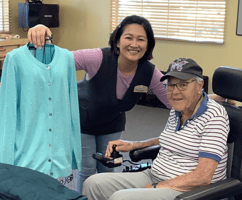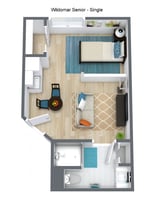Navigating the complexities of healthcare services and initiatives can be overwhelming. This guide...
Affordability Options For Seniors Looking For Senior Living
When it comes to planning for the cost of senior care, be encouraged. There are numerous financial resources available beyond your retirement savings and investments. We’re happy to help you to explore options and share you with different financial resources commonly used to pay for senior living. Contact us for more information.
VETERAN BENEFITS
The U.S. Department of Veteran Affairs offers financial aid for veterans and spouses who are in need of care. Although assistance may vary, the support can be significant for those who qualify. As we learn of their veteran status, we are pleased to direct seniors to local resources that can ease and quicken the application process for “Aid & Attendance,” through the VA. To learn more or to be connected with an Accredited VA Agent, call us at 951-678-1555.
LONG-TERM CARE INSURANCE
Long-term care insurance can cover a portion of a resident’s stay. Because these policies vary from person to person, coverage is individualized. Our Community Liaison can help identify what is required for coverage under your existing insurance policy. We can also help fill out the necessary forms and will work with your insurance provider, to assist you in receiving your benefits
LEVERAGE LIFE INSURANCE POLICIES
Whole life and universal life policies build a reserve of cash through interest-earning excess premiums (known as the policy’s “cash value”). In some situations, life insurance can be a source of ready funds through cash surrender, death benefit loans, accelerating death benefits, life (or viatical) settlements, or even selling the policy on the open market for immediate cash.
SOCIAL SECURITY
Approach Social Security (SS) benefits tactically. Historically, it was wise to take SS benefits early and invest them. Today, that’s not necessarily so. Maximized benefits may best be found through delayed retirement credits. Depending on your birth year, benefits increase by 3-8% annually. So if you wait until age 70 to collect, that monthly check could increase by 25% or more. A surviving spouse receives the entirety of that benefit upon the worker’s death, making delayed retirement credits even more valuable. Study the new rules to choose your best course. Click here for original source info.
MEDICARE
Think of Medicare as health insurance for those 65 years and older, regardless of income. While Medicare never pays for assisted living, it is designed to help fund certain post-acute expenses in the first 100 days, namely hospitalization and rehab, as long as the person’s health is improving.
Once you’ve plateaued, Medicare stops paying.
Benefits may be available for home health care, but only if certain conditions are met. Medicare Part A covers hospice (palliative care) for the actively dying, regardless of income, including in a senior living community. Click here for original source info.
TAX BENEFITS
The IRS allows certain deductions on a federal tax return for the cost of housing and meals of those receiving long-term care in a senior community due to chronic illness or the inability to live alone.
Assisted living residents may qualify for these deductions if a physician certifies that they have been unable to perform at least two activities of daily living (such as eating, bathing, or dressing) without assistance for at least 90 days. The same deductions can apply to those who require substantial supervision due to memory impairment.
An adult child paying for a parent’s care may also qualify for the tax deductions if the child can claim the parent as a dependent. Consult a tax advisor for further information or visit the Internal Revenue Service (IRS) Click Here.
SELLING THE HOME
The equity built up in a private home is typically a retiree’s largest asset, making the proceeds from selling extremely helpful when transitioning to a senior community. However, selling a home in a timely manner can be challenging and time-consuming. This is especially true when adult children are not living nearby to assist.
REVERSE MORTGAGE
When one partner needs assisted living, and the other partner chooses to remain in a private home, a reverse mortgage may be a good solution. Without affecting Medicare or Social Security benefits, reverse mortgages allow a homeowner to stay in the home while drawing up the equity the couple has built. Mortgage holders get tax-free cash flow as a loan against that equity, a loan that doesn’t need to be repaid until the house is sold or the owner moves out or dies.
BRIDGE LOANS
It’s not uncommon for families to be short on funds when transitioning a loved one into a senior community. A Bridge Loan allows you to pay for rent and care in the short term while waiting for other funds to come in. Common financial shortfalls include the time that it takes to list and sell a home, or the waiting period before receiving VA Benefits.
The Bridge Loan is designed like a line of credit, bridging the financial shortfall for up to 12 months. The loan is unsecured (no collateral needed) and approved quickly with no penalty for early payoff and affordable interest payments as low as $7 per $1000 borrowed.
COMPANION LIVING
Wildomar Senior Assisted Living offers Companion Living in our community, where two unrelated people of the same sex share a suite.
Not only does this living arrangement enhance life through its companionship, but it also extends savings.


